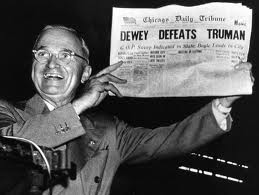
It was the month that the longest serving Prime Minister – not just in Canada, but across the British Commonwealth – Mackenzie King retired after 21 years of service. The Communists officially took over East Berlin; the Wall soon followed. Democrat Harry Truman confounded the political pundits by defeating Republican Thomas E. Dewey and became president of the United States. For the first time TV cameras captured a production (of “Othello”) on the Metropolitan Opera stage in New York.
Oh yes, and sometime during November 1948, I was conceived.
But back then that wasn’t unusual. Between 1946 and 1964 it happened more than 80 million times. It was immediately after the Second World War. Millions of adults, who had endured both a 10-year depression and then a six-year global war, turned their attention back to civilian life. They got dressed in civilian clothes again, went searching for work, fell in love, got married, established new homes and conceived a post-war generation of children. They (myself included) became the largest population explosion the planet has witnessed to date. If you believe North American economists, they also initiated the largest inter-generational transfer of wealth. This week, the Toronto Star quoted a CIBC economist.
“The parents of baby boomers … went through difficult times,” Benjamin Tal said, “(so) their propensity to save was much higher.”
According to those economists, the baby-boomer generation has or is about to inherit as much as $1 trillion from its quickly disappearing parents. Some reports suggest more than half the boomers surveyed expect an inheritance of more than $100,000. (Interestingly, the survey noted that 25 per cent of the survey expected less than $5,000.) Naturally, on Bay and Wall streets, the bankers, financial analysts and investment advisors expect to get their hands on some of that so-called “tidal wave of wealth.” So do the cruise ship operators, high-end car dealers, jewellers and condo real estate agents.
Sure, as a baby boomer myself, I am intrigued by my generation’s apparent good fortune to be the beneficiaries of the wealth our parents generated. But I think I’m more struck by what they did to accumulate it. First, I recall the stories of their scrimping and saving through the Dirty Thirties.
Theirs was a generation (whose parents comprised the massive immigration boom from Europe between 1890 and 1914) surviving on hand-me-down clothes, two meals a day at best, childhood labour that augmented their parents’ wages and survival in a North American workplace without the safety net of union contracts or universal social security. I can remember well into my teenage years that my mother never threw away a paper bag, untouched food or threadbare clothing. Like so many of her generation, she darned holes in socks, rolled pennies from her purse for her savings account, and, if there was enough left at the end of the day, she even reheated yesterday’s coffee for today’s breakfast.
It’s startling to think that from those humble moments of sacrifice and saving may come the substantial investment portfolios, the Snowbird condos, the Mediterranean cruises and precious metals stowed in safety deposit boxes of today and tomorrow. Perhaps even happier than the boomers who inherited that wealth, may be those who help now aging beneficiaries invest and grow that $1 trillion in found wealth.
I have two notable memories of the thrift that built the inheritance my parents bestowed upon their children and grandchildren. After my father died, I purchased his Corolla from my mother (living alone and within walking distance of services, she’d decided to stop driving). As I drove the car away, I thought I had cleared out all their belongings, when my knee accidentally bumped into a small pop-out door on the Toyota’s dashboard. In the hidden compartment, I found a film canister full of Loonies and Toonies. There must have been $30 in coins my father had saved for road and bridge tolls while driving in the U.S. I’ve never been able to bring myself to spending all those coins.
Several years later, when my mother died, the family went through her belongings to pass along heirlooms to her granddaughters and one great granddaughter. The final repository of her personal wealth was an ancient travel trunk, itself a family hand-me-down. Among many personal belongings inside, it contained her wedding dress, my baby shoes, and delicate linens her mother had embroidered. As we peeled away each layer of the trunk’s contents, we found yet another, long forgotten stash of coins and folded bills. I guess it had been her just-in-case fund. I don’t know how many rainy days her secret savings had fended off. But I’ve never had the heart to spend those coins or bills either.
Maybe that bit of thrift was my real inheritance as a baby boomer.